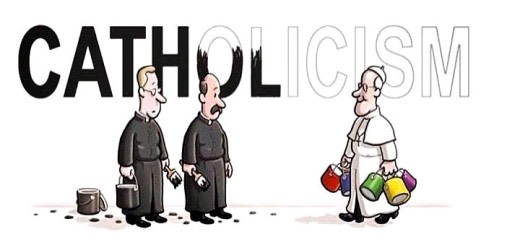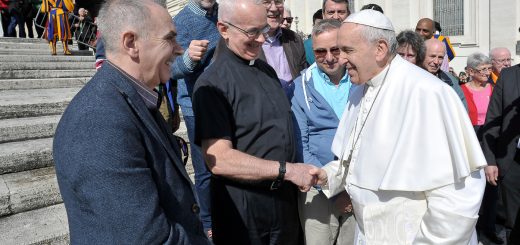The blessing gives strength to love. Blessings for couples who love each other
Subsidy for pastoral operators drawn up by the joint conference of the German Episcopal Conference and the Central Committee of German Catholics (Zdk), published on April 4, 2025. Freely translated by the volunteers of the Gionata project.
«The Church wants to announce, with words and deeds, the message of every person dignity donated by God. This message guides his attitude towards people and their relationships.
For this reason it recognizes and accompanies those couples that are united in love, which are treated with full respect and dignity, and which are ready to live their sexuality with attention to themselves, the other and with social responsibility.
Some couples ask for a blessing for their relationship. In this request they express gratitude for the love lived and hope in the future accompanied by God »¹.
Starting from this desire, the synodal assembly of the synodal journey, together with the German Episcopal Conference and the Central Committee of German Catholics (ZDK), recommended to make possible blessing celebrations for couples who do not intend to contract sacramental marriage or that cannot access it.
The theme of blessings for couples has been the subject of reflection in the Catholic Church in Germany for a long time. Unmarried couples in church, divorced and remarried people, as well as couples belonging to the full variety of sexual orientations and gender identities, are an integral part of our society.
Many of these couples want a blessing for their relationship. This request is an expression of gratitude for the love lived and the desire to shape this love in the light of faith. So far there was no general subsidy on how pastoral operators could respond adequately to this request.
For this reason, the Synodal Assembly has provided that the German Episcopal Conference and the ZDK presented as soon as possible of the proposals shared on the conditions and the form of the blessings. This subsidy responds to this assignment.
In the meantime, the conditions on a universal ecclesial level have changed significantly: on 18 December 2023 the dicastery for the doctrine of faith, with the approval of the Pope, published the declaration ABSTRICANS TRUST - On the pastoral meaning of blessings (FS). In it we explicitly take a distance from the previous categorical refusal of blessings for couples who cannot access the sacramental marriage³.
The Confidence supplicans He intends to promote the pastoral approach of the pontificate of Pope Francis, proposing "a consistency between doctrinal and pastoral aspects" (FS 3).
The declaration also invites you to reflect more deeply and with greater appreciation on the meaning of blessings. The blessings, in fact, "invite us to grasp the presence of God in every event of life and remember that the human being, in the use of the things created, is called to seek God, to love him and serve him faithfully" (FS 8).
With Pope Francis, the Conference confidence Remember that, before every single blessing, the "great gift of God, a blessing for all humanity, a blessing that has saved us" (FS 1) is Jesus Christ himself.
Asking for a blessing therefore means thanking and praising the goodness and greatness of God, his gifts, the gift of life and love (see FS 10.15.29). «The request for a blessing expresses openness to transcendence, devotion, closeness to God in the most diverse circumstances of life, and feeds them: this is not a little in the world in which we live. It is a seed of the Holy Spirit who must be cultivated, not hindered "(FS 33).
In a very similar way, even the text of the synodal journey states that in the request for a blessing by couples, people's desire to live their relationship in the horizon of God is manifested and inspired by the good news. Fortified by the blessing, these couples make their Christian faith fertilize and their relationship with God in their union, in families, between friends and in the communities, sowing blessing in and for our Church "(SW 20, n. 21).
In a culture like ours, where human dignity, equality and self -determination are fundamental assets, and where there is a great welcome towards love relationships experienced with responsibility, the vision proposed by the confidence of the Supplicans trust even more meaning: everything that in these relationships and in these common lives is "true, good and humanly valid" is "enriched, healed and high from the presence of the Holy Spirit" (FS 31).
In fact, every time a person asks for a blessing, he expresses the desire to experience the values of the Gospel with greater loyalty (see FS 40). "This request must always be accepted with appreciation, accompanied and accepted with gratitude" (FS 21).
Blessings, as an expression of faith, enrich the life of the Church and deepen the understanding of the relationship between God and the human being. They become "a pastoral resource to be enhanced" (FS 23).
Indications for pastoral practice:
- According to what was decided by the synodal journey, both ordered ministers and those who have been appointed by the bishop for the celebration of rites (SW 20, n. 7) can impart the blessing.
- Supply confidence entrusts the method of blessing to the experience, pastoral prudence and spiritual sensitivity of the person who blesses (FS 35 and 41). An attitude of esteem must be reserved for all people asking for the blessing.
- The declaration explicitly states that to ask or receive the blessing no further condition is required, if not common trust in the support of God (see FS 12 and 25).
- Pastoral operators who do not feel like blessing or have doubts in conscience can direct the couple to supporting people (e.g. in charge of the pastoral with queer, the family or marriage pastoral of the diocese).
- Specific training courses for pastoral operators must be offered.
- As expected, the experiences related to the blessings of couples who love each other will collect and evaluate (see SW 20, n. 10).
- Blessings can and must be characterized by greater spontaneity and freedom, based on the concrete situation of people. For this reason there are no liturgies or prayers officially approved.
- It is important that the blessing is not confused with the sacrament of marriage.
- Blessing symbolically represents an event between God and people. It must be clear that people ask for God's blessing for their relationship, a blessing that is offered to them with reliability.
- Blessing is also ecclesial: the Church is at the service of the encounter between God and the human being. The couple's desire to walk in life under the blessing gaze of God takes seriously, and recognizes in this request the hope of a bond with God capable of supporting life.
- To encourage the couple in this hope, all the people involved in the blessing are invited to actively participate with acclamations, prayers and songs.
- The blessing requires shared preparation that takes into account the couple's requests and desires, taking care of the context and form with theological sense.
- The style of the celebration, the place, the overall aesthetic (including music and singing) must express the value of the people who ask for the blessing, their relationship and their faith.
- The proclamation of biblical texts adapted to the situation serves to manifest the link between the saving action of God and the blessing. These texts can also be explained.
The prayer of blessing is addressed to the God testified by the Bible, remembering his love story with humanity and creation with honors and gratitude. This follows the prayer of blessing for the couple, which ends with a performance of praise to God.
Those who receive the blessing of God walks under his gaze of love: the sacred writing is convinced of it (see numbers 6.24 ss.). Being blessed by God means traveling the path of life under his loving gaze.
We do not travel this path and we must not travel it alone. We share it with the people that God supports us, surrounded and supported by the great communion of believers of all time.
¹ Taken from the resolution of the Synodal Assembly of 10 March 2023: "Operating text on the celebrations of blessing for the couples who love each other", in: The Synodal Way, 20. Decisions of the Synodal Way of the Catholic Church in Germany, by the Synodal Way Secretariat (Bonn 2023), p. 283 (full text pp. 283–290, mentioned as SW 20).
² «In pastoral practice it is found with frequency that homosexual couples ask for the blessing for their relationship. The same happens for civilly remarried couples, who want a new beginning. Couples also ask for it that do not yet feel ready for the sacramental marriage, perhaps because only one of the two is believing or close to the Church. More and more often, even baptized couples also ask for a blessing "(SW 20, n. 13).
³ See the Responsum ad dubium of the Congregation for the doctrine of the faith of 22 February 2021 (AAS 113 [2021], pp. 431–434).
Original text: Segen Gibt der Liebe Kraft






